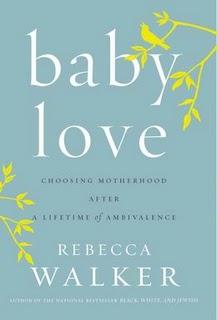Baby Love: Choosing Motherhood after a Lifetime of Ambivalence

After reading the first few pages of Baby Love in the aisle of a midtown Manhattan Barnes and Noble, I bought a brand new hardcover copy. In recent interviews Walker has said that this is the book she wishes she'd had to read when she was in her twenties. I thank her for writing it. While much of the memoir focuses on the minutiae of Walker's pregnancy—foods eaten, clothing purchased, websites trolled and unnecessary arguments had—her larger commentary on the absence of intergenerational discussions between older and younger feminists about childbirth—save the advice that we have plenty of time—is what most interested and inspired me.
Rebecca, now at thirty-seven, is the daughter of feminist icon and celebrated author Alice Walker. Their tempestuous relationship underscores much of the text, and the trials of motherhood—chosen (Rebecca's) and seemingly ambivalent (Alice's)—and illustrates the complexities of the discussion Rebecca wishes feminists were having both amongst ourselves and, indeed, out there with the rest of the world. "Fertility is finite" she warns, and she encourages young women to take heed and plan having babies just as ardently as her mother's generation urged us to plan careers and develop ourselves into whole people. Her musings on motherhood have gotten her a lot of flack in the press recently. Most infamously, the chapter about her relationship with her stepson, Solomon, has gained attention for her assertion that the love one experiences for a child one has carried to term and given birth to differs from that of a child who has become yours through adoption or marriage or family arrangement. Rebecca Walker is not comparing one love to the other, but is merely saying there are different kinds of love, and all should be valued equally, even in their difference.
Walker's second memoir concludes with the birth story of her son, Tenzin, named after His Holiness the Dalai Lama and the statement "I have no regrets." Ultimately, Walker is encouraging young feminists to be as decisive about our choices to mother or not to mother as we have been about other parts of our lives. In a time when birth in the U.S. has turned into such a profitable industry for insurance companies, hospitals and advertisers, women's reproductive choices—from abortion to the choice to give birth and mother—are as important as ever. Baby Love calls our attention to a hardly discussed topic among young feminists: breaking through the ambivalence around motherhood that is fostered through the constant conflict between second wave feminism telling us that we have plenty of time and the larger establishment pushing us to be mothers because we can, instead of because we choose to.
Here here! Brilliantly done Ms. Domingue. This book clarifies the focal point of the pro-choice movement and centers it on the operative word: choice. Thank you for reviewing this book and bringing it to the fore of our subway check-ins and chit-chat!Kristen Dominguewww.beignagainnow.org